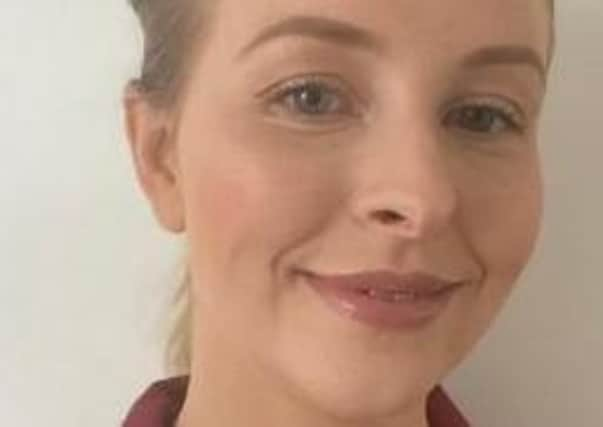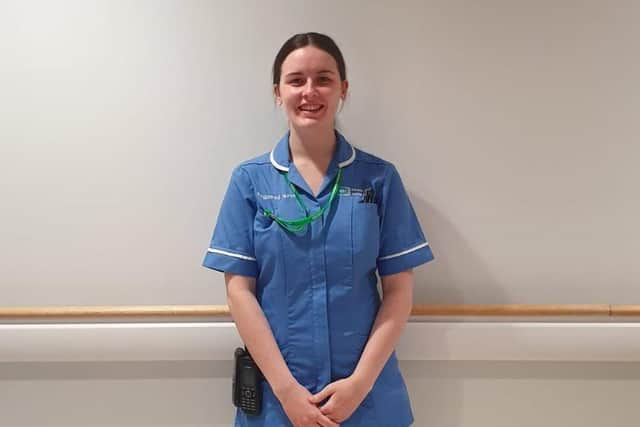‘I’m proud of how we reshaped our service so quickly and efficiently’ during a global pandemic.


Kate Moran
Tissue Viability Nurse
Tell us about yourself and your work?


My name is Kate Moran, Tissue Viability Nurse covering the Western Trust area across Acute and Primary Care services. I qualified as a Nurse in 2012. I am in my current role as Tissue Viability Nurse since May 2019. I previously worked in ICU, Tracheostomy Team and Medical Wards. I am married to Gary and we have one little girl called Molly (4).
Why did you choose this job?
I have always had a love of caring for wounds all my career. I was always the nurse others came to for advice on wound dressings. I love learning about new wound products, carrying out case studies, research, trials and audits. I always knew I wanted to progress my nursing career so Tissue Viability was my dream job.
Advertisement
Hide AdAdvertisement
Hide AdIt has been a particularly challenging couple of months for all health care workers due to the COVID-19 Pandemic. Can you explain what has changed in your role? What are the best and most challenging aspects?
We have had to move away from face to face to virtually assessing patients due to COVID-19. It was challenging at the beginning reshaping our service but seeing the positive feedback from patient and colleagues makes it all worth it.
This is the Year of the Nurse/Midwife and although many plans to celebrate have been significantly curtailed due to COVID – what makes you proud to be playing your role as a nurse?
This year due to COVID-19 our profession has been part of the front line in tackling the pandemic. I have used my skills on both the front and back lines in my role to ensure patients receive optimum care.
Advertisement
Hide AdAdvertisement
Hide AdAll health care staff have risen to the challenges faced by this global pandemic. Many traditional services have had to be stopped or done in a different way either via telephone or virtual clinics. Have you experienced this in your role and how do you think this has or hasn’t worked?
We have had to change our service completely during COVID-19. Our outpatient Complex Wound Clinic was stopped. Together with our Lead TVN we re-shaped the service and passed a policy with Information Governance to allow us to virtually assess wounds via consented wound pictures. This change has worked really well and we have gotten great feedback from both patients and staff. We can give more timely personalised care plans and triage the really complex wounds that need a face to face assessment. We will definitely be holding onto these gains post COVID-19.
Looking forward to the next year or so – what would you like to see achieved in Health and Social Care?
I hope our service and others can hold onto the good things that came out of the pandemic, let go of the aspects that weren’t working and move forward to create a better service for its users and staff.
Advertisement
Hide AdAdvertisement
Hide AdHow does your work help in the overall delivery of Health and Social Care services?
As we cover both acute and primary care our service is invaluable for keeping chronic and complex wounds from needing hospital admissions and helping support discharge to primary care. I believe Tissue Viability is an invaluable link to both sectors.
Furthermore, through staff support, education, audits and research we help provide quality evidence based patient care.
How have you and your colleagues supported each other during this global health crisis?
Advertisement
Hide AdAdvertisement
Hide AdTissue Viability is a very small team but we work very well together with our Lead Tissue Viability Nurse. I am particularly proud of how we reshaped our service so quickly and efficiently during a global pandemic.
What advice would you give to the public on how they can help the NHS deal with the ongoing pandemic in the months ahead?
Adhere to government advice, look after your physical and mental health and always be kind.
Danielle O’Connor
Deputy Sister, North West Cancer Centre.
Tell us about yourself and your work?
My name is Danielle O’Connor. I am 27 years old and I have been a qualified nurse within cancer services for four years. I was extremely nervous about starting my nursing career as an agency nurse. I began my first shift with the agency as a Staff Nurse on Ward 43 (Oncology/Haemotology) at Altnagelvin. The nursing staff are amazing in what they did daily, especially when they had been caring for a young patient aged 20 and being so resilient to her care needs it inspired me to develop in this area of nursing.
Why did you choose this job?
Advertisement
Hide AdAdvertisement
Hide AdWard 43 allowed me to develop in such a wide variety of skills within cancer services. Ward 43 is an acute oncology/haemotology ward with many acutely sick patients that required your assistance to make them feel better clinically and also support them mentally. Whilst the business of the ward was extremely daunting as a newly qualified nurse the support from staff in aiding your skills and qualifications and also the patients with their thanks and gratitude made everything worthwhile. Fast forward four years I am now currently a Band 6 deputy sister within cancer services ward 50 oncology and haemotology. This role is a new change for me allowing me to expand in my skills and develop as a nurse.
It has been a particularly challenging couple of months for all health care workers due to the COVID-19 Pandemic. Can you explain what has changed in your role? What are the best and most challenging aspects?
Taking up a role as Band 6 deputy sister during the COVID-19 pandemic has come with many challenges. I am learning not only how to take on the role of a Band 6 deputy sister but also learning how what you have learnt as a nurse, policies and procedures, have all now changed to what you have previously learnt. Policies and procedures are changing on a daily/weekly basis. The checking of blood products, admission pathway, CPR, infection control, visiting policy are some of the few policies that have changed how we undertake our nursing role.
The changing of policies and procedures has placed us in more difficult situations than we would have liked and were previously taught. However working within team, maintaining effective communication with patients, relatives, multi-disciplinary team and most importantly management allows us to reassure those within our care and also provide the reassurance to ourselves that’s required.
Advertisement
Hide AdAdvertisement
Hide AdHowever whilst COVID-19 has come with many challenges it has also highlighted many benefits. The pandemic has shown us as professionals how much our community respect the role we take by a simple clap on Thursday. The pandemic has highlighted how amazing our NHS is and how lucky we as a community are to have the NHS. COVID-19 has emphasised how amazing our workforce is and how we can work as a team to fight against a world pandemic together.
This is the Year of the Nurse/Midwife and although many plans to celebrate have been significantly curtailed due to COVID – what makes you proud to be playing your role as a nurse?
During COVID-19 many adaptions have been made with regard to face to face interactions now being made virtual.
Due to a reduction in face to face interactions it has allowed me to better support the nursing staff especially those newly qualified, and most importantly the patient. Moving forward into the future virtual telephone appointments and meetings are something that will help utilise the time for professionals and the patient.
Advertisement
Hide AdAdvertisement
Hide AdWhat advice would you give to the public on how they can help the NHS deal with the ongoing pandemic in the months ahead?
The public have been amazing during the COVID-19 pandemic. They have been patient with regards to visiting on the ward and extremely understanding of the restrictions in place. Relatives have had great reassurance from staff and daily telephone calling has allowed staff to build relationships with each patient’s relatives.
The public including the patients have helped prevent the COVID-19 outbreak from being more severe by abiding by the guidelines advised by the government especially with regards to isolation.